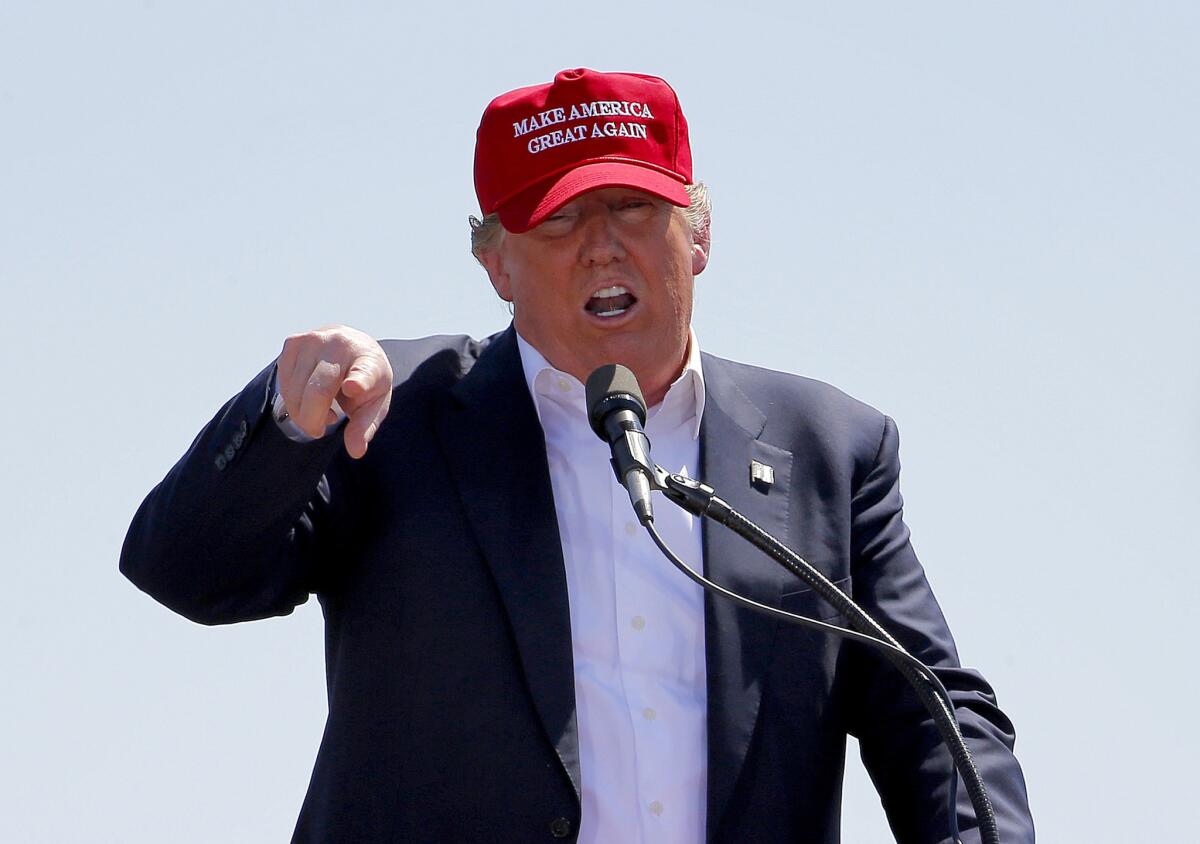3 ways the unpredictable GOP presidential race could shake out

Can Donald Trump secure 1,237 delegates by mid-July? If not, Republicans may have the first contested party convention in more than 60 years.
- Share via
After 39 contests and more than 20 million votes cast, the Republican presidential race has narrowed to three candidates and three possible scenarios.
The first, and most likely, is that Donald Trump wins the delegates he needs to mathematically clinch the GOP nomination ahead of the party’s national convention this summer.
The second, testing Trump’s much-vaunted deal-making skills, has the businessman and reality TV star coming up just shy but bargaining his way to the 1,237 delegates he needs to take the nomination.
The third scenario, and the hope of rivals Ted Cruz and John Kasich and other forces arrayed against Trump, is forcing an open convention that picks the nominee on the floor of the convention in downtown Cleveland.
If Trump continues winning primaries at just about his current pace, he could have all the delegates he needs before the opening gavel falls on July 18, or will at least come close.
After Tuesday’s victory in winner-take-all Arizona, Trump has 739 delegates, far more than either of his two remaining GOP rivals, Ted Cruz and John Kasich, and more than half the number needed to lock down the nomination, at least on paper.
Still, his opponents and others fighting Trump are hardly giving up. They hope to deny him a victory in the first round of balloting, forcing an open convention and the first to require multiple ballots since the Democratic convention in 1952. (The last Republican convention to go multiple rounds was in 1948.)
See more of our top stories on Facebook >>
Much will depend on the outcome of primaries in several big states that have yet to vote, including Wisconsin, New York, Pennsylvania and, on June 7, the biggest of all, California.
Trump has won 48% of the delegates awarded so far and needs to win just over half, 54%, of those remaining to reach 1,237, according to tracking by the nonpartisan Cook Political Report.
Texas Sen. Ted Cruz needs to win 86% of remaining delegates to clinch the nomination, which is mathematically possible but not realistic. Ohio Gov. John Kasich has no chance of getting the nomination short of emerging the choice of a contested convention.
“Going forward, it’s going to take something we haven’t seen to date to derail Trump,” said David Wasserman, who manages the delegate count for the Cook report.
While the math is straightforward, myriad permutations could determine who Republicans send forth against the Democratic nominee in November, especially if Trump were to fall short on the convention’s first ballot.
TRAIL GUIDE: All the latest news on the 2016 presidential campaign >>
Of the 2,472 delegates arriving in Cleveland, most will probably support their candidate whole-heartedly and do everything they can to ensure they win the nomination. Scores, however, will be “unbound,” leaving them free to back whomever they choose, regardless of how people back home voted.
Still others will be required to support a candidate on just the first round of balloting, and are then free to switch their allegiance. The rules governing delegates differ from state to state.
Each of the three remaining candidates have set up operations designed to ensure the loyalty of their delegates, court those who are free to choose and poach still others who are either wavering in their commitment or willing to switch after the first ballot.
Much of the effort is taking place far from the upcoming caucus and primary states, in places that have already voted, as party members gather at the state and local levels to select the individuals they will send as delegates to the national convention.
The campaigns are also working behind the scenes to place sympathetic members on the convention rules committee, which consists of 112 party members — two from each state and six U.S. territories — who will meet ahead of the gathering to decide how the four-day session will run.
While seemingly arcane, the decisions made by the panel could be crucial, determining, for instance, which candidates can have their names placed into nomination. (The rules are subject to approval by the full convention.)
For Trump, the calculation is straightforward.
He recently said on CNN he expected to win enough delegates to clinch the nomination ahead of the convention, but if he fell short “and we’re at 1,100 and somebody else is at 500 or 400… I don’t think you can say that we don’t get it automatically.”
“I think you’d have riots,” he added. “…I wouldn’t lead it, but I think bad things would happen.”
Many rank-and-file Republicans seem to agree — not necessarily with Trump’s threat of violence but with his underlying argument.
A recent nationwide Bloomberg Politics survey found 63% of those who voted in this year’s GOP primaries or caucuses believe the person with the most delegates deserves the party’s nomination, even if he arrives in Cleveland short of a majority.
Follow @markzbarabak for national & California politics
ALSO
Clinton criticizes lax campaign finance laws between two L.A.-area fundraisers
Bernie Sanders’ campaign legacy could be how he raises money from so many people
Seattle’s progressives see a Sanders win in Washington as a way to send a message to Democrats
More to Read
Get the L.A. Times Politics newsletter
Deeply reported insights into legislation, politics and policy from Sacramento, Washington and beyond. In your inbox three times per week.
You may occasionally receive promotional content from the Los Angeles Times.











